i like all y'alls art 🇵🇸free palestine -> https://www.adalahjusticeproject.org 📝i write fanfic from my cave https://archiveofourown.org/users/justheretoposttrash/works
Don't wanna be here? Send us removal request.
Text

🍉 BNHA Gotcha for Gaza 🍉
Donations will be closing in THREE DAYS! Don't miss out on your chance!
Gotcha 4 Gaza is a fundraiser for Gaza where you get a fic or art commission in exchange for a donation!
Donator Sign Ups are open here
You can find out more about us here on our website!
13 notes
·
View notes
Text

🩸
#endhawks#tw blood#tw gore#cw blood#cw gore#that tweet thread that goes “what feelings do men experience” “^whatever the hell this is”
36 notes
·
View notes
Text

MHA Halloween Zine Masterpost!

Howdy my dudes!
Here below you will find a link to each artist and their piece of work created for the MHA Digital Halloween Zine of 2024! If you find something you like, be sure to let the creator know! Comments and kind words are what keep our flames burning!
Fanart and Fanfiction in No Particular Order: @wichitalk - JeanHawks Fanart
@fleetingspacee - All Might in a Halloween Costume
@moo-chemia - TodoBakuDeku Kids Trick or Treating
@champie-moon - BakuDeku Kids Trick or Treating
@sillygh0stie - TogaChako Fic
@akataiii - BakuDeku Fic
@justheretoposttrash - EndHawks Fic
@virtualflesh - Eraser Family Fic
(will be updated as other submissions are finalized)
68 notes
·
View notes
Text
holy COW these songs are so toga-coded (if a lil on-the-nose)
youtube
youtube
like. dripping with her vibes
#maybe y'all already knew about these idk#it's not so much that i don't even go here and more like this is not the cafeteria table i normally sit at but#hello goodbye enjoy#toga himiko
1 note
·
View note
Text
y'know, i saw 00:05-00:10 of this vid 🔽 with the wings unfurling and immediately thought "he didn't have to do all that" lmao. there's no in-universe explanation besides him wanting to show off
youtube
I’ve just realized 😂 that typically Hawks keeps his wings fairly relaxed when not using them



But then in a bunch of panels where he’s in front of Enji…

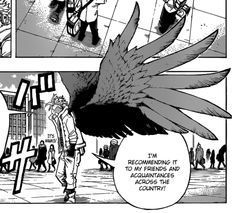

He’s preening by showing off his wings. Take this how you will lolol 😆
#endhawks#endhawks fans are onto something in that we took the Cool Guy character and collectively decided the inside of his head is a hot mess#Youtube
351 notes
·
View notes
Text


you've got it bad
#endhawks#i need 'em to be cringe about each other when no one's watching#which is already canon / canon adjacent#didn't mean to make a drawing i just got distracted lol
29 notes
·
View notes
Text
you raise super interesting points about ofa!! i recall members of class 1-a discussing how bad it was when deku was awol, and how the fact that all might was with him wasn't actually reassuring, bc one just inherited the self-sacrificial work ethic from the other. and it makes complete sense that dialogue and scenes such as this one comment on japan's culture of overwork! i appreciate you pointing that out.
ofa, tonally, is very interesting in how it's treated in mha. there's its bloodied history of lives cut short, as well as aspects such as nana shimura sacrificing her ties with her family in an imperfect attempt of selflessness, creating her own domino effect of generational trauma. at the same time, it's tonally treated as such a rainbowy, optimistic, collaborative thing at times. iirc no one in the text really seems to outright question its supposed "moral good"--even hawks talks about it as this big heart-connector. which isn't to say we as readers can't or shouldn't disagree or view that with nuance. it's just that mha itself isn't consistent about answering the problems with ofa that it sets up *directly*, as far as i remember. but it does have its indirect, intentional answer in the form of deku being brought in to rest at u.a. before the final war. there's that emphasis on "who will look out for heroes?", and the implication from deku's perspective is that it's okay to lean on others--that it's not "one", aka just yourself, for the good of all, and that it's better to not do everything alone, no matter how "worthy" the cause may seem. mileage can totally vary on how cohesively and convincingly this was executed, ofc.
you made me realize something very cool about ofa just now, actually! whether intended symbolically by the text or not, it could be read that deku losing each wielder in the final fight is part of him saying goodbye to the previous generations' instruction. his power ends up being replaced not by the "wisdom" and pressure of the past, but by the literal culmination of his peers' wishes when they get him his suit. so there's that dimension of his new power being a manifestation of the "future" generation, moving forward and unburdened by what came before.
i admittedly don't recall all might punching deku or the context, but if i had to guess it was something the story played for laughs or something? honestly the culture at u.a. is wild at times. morally, across both result and intent, i personally place all might and endeavor in different categories (i say this as someone who fucks hard with endeavor's character, like so hard), though the toxicity of raising young heroes and what they put them through is such a real overlap! you make me really wish shoto had gone up to deku at one point and echoed his affirmation back at him, something about making the power his own or not having to define himself solely by his inheritance. they were already great foils as you pointed out, and a moment like that would've been SO GOOD. at least, i'm pretty sure that didn't happen? unless, again, i'm forgetting something crucial lol. and nw about the rant, as long as there's good faith going on, i welcome the enthusiasm! and clearly wordiness and going on tangents is not something i try to avoid, lmao
day 4 of being incredibly normal about hawks and endeavor (but mostly talking about manga spoilers in general):
mha is a story incredibly interested in exploring generational support, generational abuse, and what people pass on to each other (alongside hand motifs and showing the childhoods of different characters). you pretty much can't get through any arc without running facefirst into a plethora of examples, but ofa and afo are fun (and perhaps appropriate) places to start!
horikoshi features doomed siblings almost as much as he features terrible fathers, and these two are no exceptions. alongside those versatile hand motifs, afo literally uses his hands to take from others, while anything he has to "give" goes to those younger than him, and it's pretty much always a direct vehicle for trauma. it works well that he's lived for such a long time, literally sustaining his own life thanks to hoarding more and more power and resources for himself, while also giving him that age hegemony over all other characters we meet. he thusly kinda becomes the mustache-twirly Evil Dad² in a metaphorical sense, ruining the futures of others as he attempts to write his own narrative exactly how he wants it (storytelling is also a big theme in mha, go figure. when i consider that one definition of trauma--as something that disrupts the narrative one has of themself--and how AFO hands out trauma also as a way of commanding power and controlling the narrative, it really all comes together).

Yoichi is, of course, opposite in so many ways, centered around giving instead of taking. the inception of ofa began as a (very, uh, heterosexual i'm sure) act of granting freedom and sacrifice.
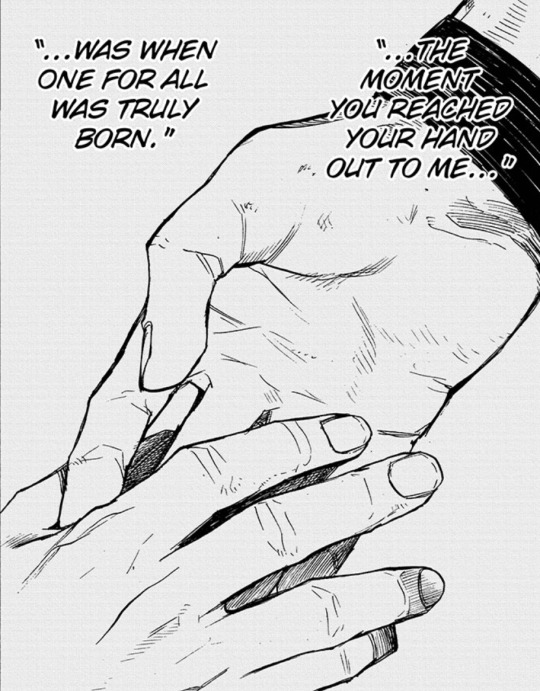
the ofa wielders don't just give their powers to the stockpiling quirk; they also give their lives, through combat or through cutting their lifespans or both. opposite to afo's Big Mean Father² lifespan, the lifespans of the ofa wielders are very short. they sacrifice their own futures to make the futures of others brighter. and of course, through the act of passing on the quirk, ofa necessitates an act of giving from one user to the next. it's a hand-off of counsel, support, and duty that helps shape each receiver into the best kind of hero they can be. afo passes down trauma, and ofa passes down tools for one's betterment. pretty standard parallels to how a bad caretaker/good caretaker can, even through a single act, shape an entire existence younger than them. relatable! trauma nation rise up!! 💪💪💪
with these themes in mind, then, it's a no-brainer as to why mha features so many godawful fathers (also i'd bet a hundred bucks horikoshi has daddy issues. a thousand. a trillion, honestly. gimme money). though relationships that fall outside the clear-cut power-dynamic of a parent to their child still carry these themes well. peer-to-peer,

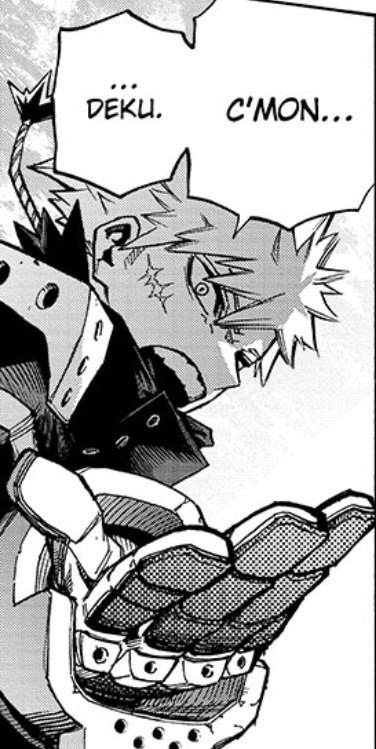
sibling-to-sibling, etc., the list of other examples goes on and on!
endeavor's character certainly straddles a lot of these ideas, perpetuating a lot of column A (bad) and a bit of column B (good). he receives trauma from his father in the form of spiraling thoughts about failure and mortality (and maybe those two things are totally equivalent, right?) ((they're not)). his response to that trauma then goes far in the other direction, an obsession with herodom and invulnerability (especially avoiding or punishing emotional vulnerability) that passes the trauma right down to his family. in all his desperation to avoid the tragedy of his father's death, he ends up causing the tragedy to repeat itself, this time with touya's (apparent) death. it's even a direct result of the quirk he gave to touya. every intangible and tangible thing touya inherited from his father would only go on to hurt him, and the worst thing that could possibly have happened does indeed happen. instead of coming to terms with the fact that he gave touya the wrong things---trauma and a fire to burn himself with---he gives more of the same to shoto. surely the same tragedy won't repeat a third time. surely what he passes down to his youngest will make him come out of everything gloriously successful and *alive* (and those two things are totally, definitely equivalent) ((and again, they're not)).
what blows my mind is just how close the todoroki family was to witnessing yet another repeat of the tragedy--that they might have watched endeavor die while failing to save someone, just as endeavor had watched his own father do the same---and that they nearly had to bury touya a second time.
similarly, when it comes to the past transferring to the future, childhoods are the foundations upon which peoples's futures are built. characters are not only shown in a state of emotional vulnerability when in Baby Form, but are also responding to and trying to find answers to each others's traumas and core drives.
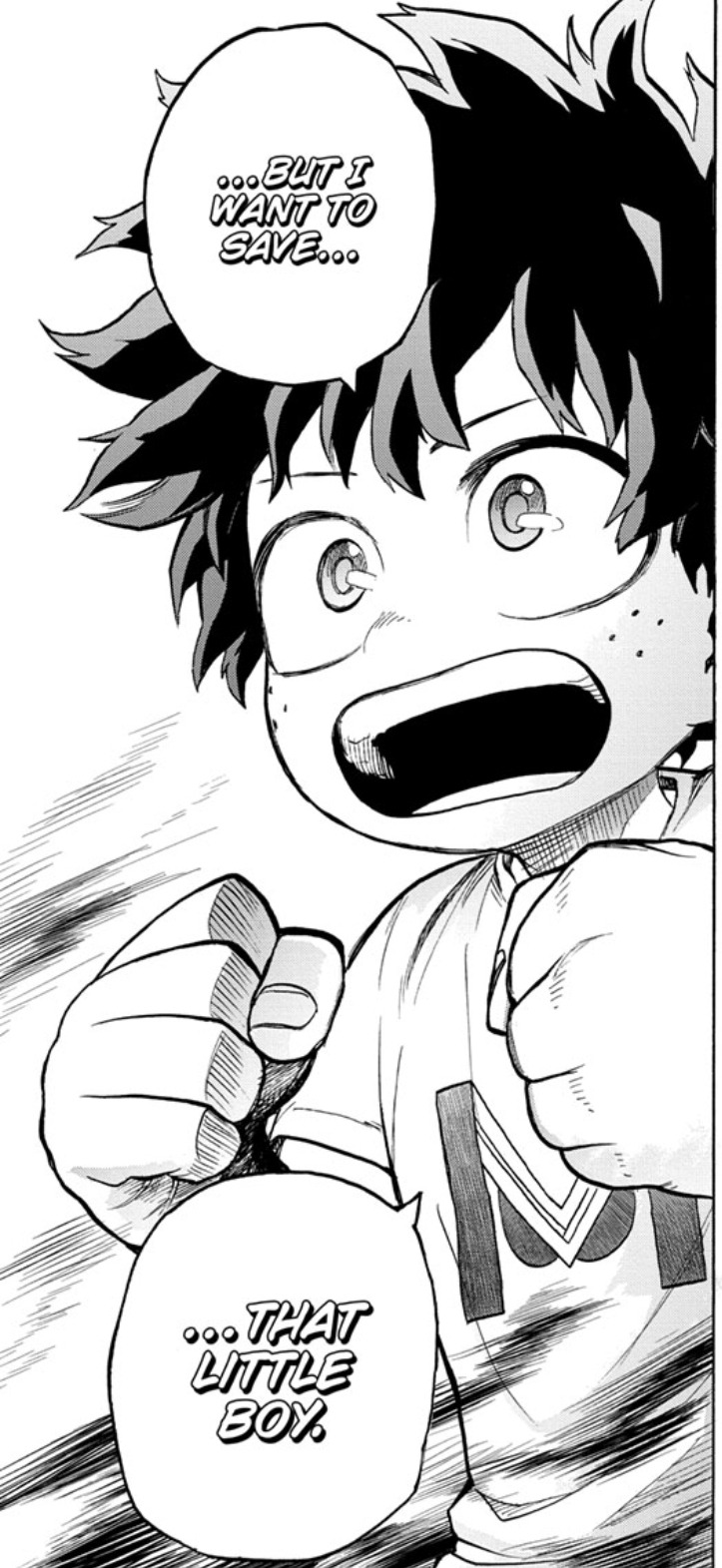
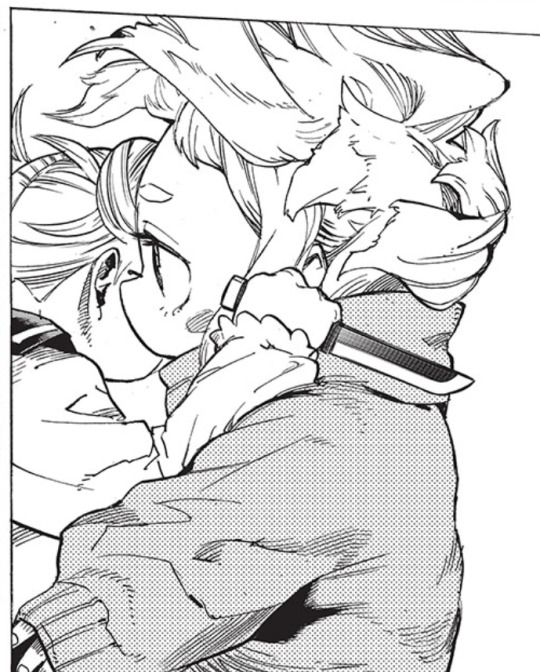
in a sense, they don't just inherit their worldviews from the prior generations, but from themselves. when we see endeavor confront his younger self, he isn't only killing off who he used to be, but also all the conclusions he had drawn from his own childhood--a rejection of what his trauma response got wrong. most people have to learn to stop being cruel to their inner child, whereas his inner child is the cruelest voice within.
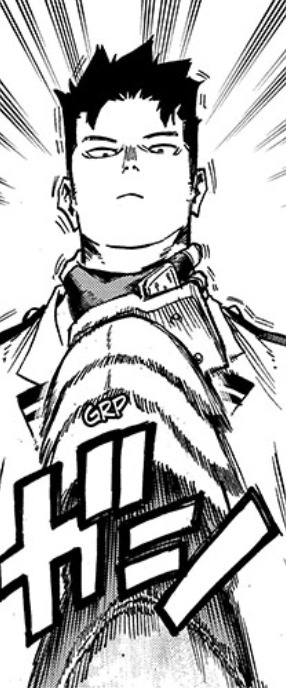
anyway, for all the Bad Shit endeavor has passed on to the next generation, the future and hope he provides for hawks is something else. despite all white-knuckled efforts, he doesn't end up saving his family, nor himself, and certainly not touya, but he saves hawks, and that one instance contributes to the entire idea of ofa and the question of what different people can give to each other.
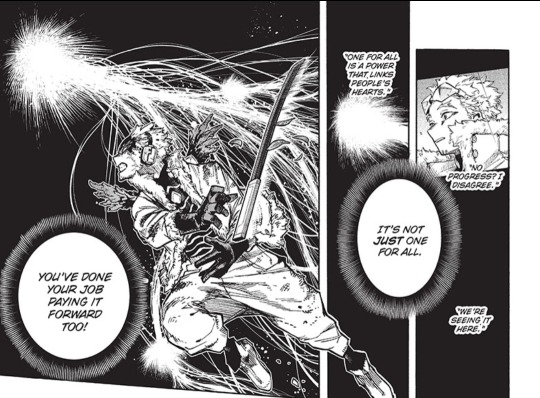
as invested as hawks is in the future, he initially keeps himself pretty distant when it comes to those younger than him. there isn't much explicitly given as to why, but it's pretty natural to assume that he really doesn't have the tools to pass on anything healthy--not after what he's been given by others. the one good thing he knows how to give is the one good thing he's received, which is the act of saving itself. being a pro is the only language he has for the longest time, and once his back's to the wall and he has to give tokoyami whatever he can, we see how readily he assumes that what he has to offer just isn't good enough.

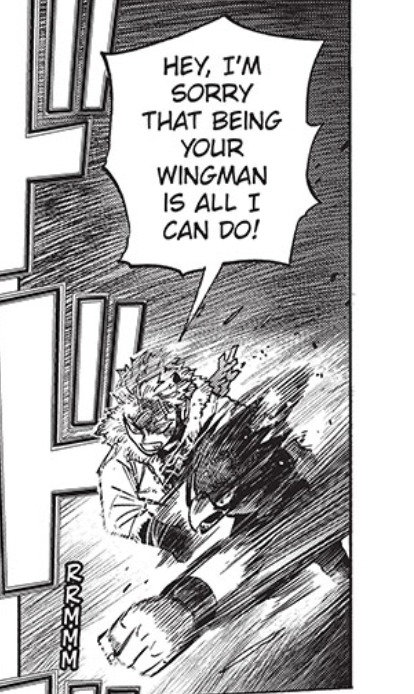
(not only did his parents pass trauma onto him, but in valuing or devaluing his wings and thereby making his worth always conditional, they also affected what he could then pass on to others ((or at least, how he conceived of what he could give)).)
in my view, hawks gives tokoyami flight and endeavor support, and from tokoyami he receives the idea that he's someone worth looking up to and fighting beside despite his shortcomings, while from endeavor he not only got saved as a child but also receives a proof-of-concept of the ability to radically change, to wind up in a morally/emotionally better place than where one started. (he not only contrasts himself against shoto for the kid's ability to forgive/work with his parents, but notably contrasts himself against endeavor due to the latter's willingness to engage with his past, which he views as a vulnerability but also as something admirable.)
given keigo's middling age in the main cast of characters and the interesting space he occupies, it's fitting that he would ultimately act as a sort of channel between the generations of heroes as of the finale, retaining some of the value from what came previously while also helping guide what comes in the future.
36 notes
·
View notes
Text
day 12 of the final endhawks: endhawkspocalypse:
the adhd side of my brain has taken over and decided that consistency can No Longer Happen, so i've decided to make this my last day of posting, at least when it comes to sequential daily posts. i'm still unhinged-ly working on endhawks-related things for the foreseeable future though, and always happy to talk about the ship!
here's a final hodgepodge of thoughts!
part 1 - more ch430 positives
the continued use of a ranked *number system* in particular is silly imo (ig the masses do love a catchy numbered list). but at the very least, i gotta appreciate that the main characters didn't get top rankings straight outta school--when i think about how old they are post-timeskip compared to hawks, especially! bbygirl got #2 at 22 but was child-soldiered into it and was absolutely breaking his proverbial back. it's really not an aspirational thing to beat, and it's not something the main characters have to achieve to be "cool" or fulfilled narratively. they focused on their happiness, instead--shoto on finding his own identity and balancing his life thanks to his support system, bakugo on getting his boyfriend/whatever/queerplatonic-died-in-each-others'-arms-on-a-battlefield-in-a-past-life-and-now-they-keep-reincarnating-together soul-partners/rival back at his side so they can keep pushing each other, etc.! mirio's ascent notwithstanding, it's a healthy nugget from the final chap.
another cute thing from 430 is when hawks jokes that nagant is a villain. this joke has layers to it, considering both had to take on the villain label because of the commission, also contributing to their respective traumas under the commission. (they both even had someone cradle them in their arms shouting that they were still a hero despite them being at their low points--and physically very crispy. one of those someones being hawks himself, ofc.)

next, i gotta appreciate how unfettered hawks's facial expressions have become (also, his under-eyes are already thicker and darker, bro needs to sleep 😭) compared to how subdued they were in the twice fight (and to be clear, his expressions still screamed volumes then. i love how they're drawn to convey so much nuance in his emotions). once he was cut free from the commission, he stopped putting on a smile while doing hero work (there wasn't much to smile about post-raid, but pre-raid i'd argue things were bleak for him already, so at least he doesn't feel the need to put on as many airs). he also started actively sweating and showing fear, but without losing more genuine displays of confidence and happiness. (all this makes me very curious if his speech patterns have also changed in the original japanese to any extent compared to how they were at his introduction)

part 2 - dabi=endhawks truther?!?! *not clickbait*
i remember it being kinda hilarious that dabi tossed out hawks's history as an extra "fuck you" to endeavor, but i forgot how direct he is about his intentions.

he's just like, "yeah, i specifically wanted to drag hawks (and reveal his betrayal and hopefully shake your faith in him) to hurt you, dad. even though you two have hung out, like, maybe twice (may he rest in peace) in your whole lives. trust me, i knew this would be devastating for you. don't ask me how i know." like. touya my man. what are you doing. also thank you. almost makes the angst-lover in me wish he'd added a "don't worry about hawks, dad. you'll be joining him soon" right before attacking him with prominence burn to twist the knife, though understandably that would've convoluted the spotlight when the focus was meant to be on family and the touya reveal. but goddamn, just imagine.
he basically did the exact same thing to hawks by telling him his identity. in revealing a name that could only hold any significance to hawks through its relation to endeavor and what touya's existence implies about him, touya wielded a secret from endeavor's past to psychologically hurt hawks and shake his faith. it's just wild that he did it to both of them, pulled off flawlessly and with maximum drama, in rapid succession. legendary.
anyway, ppl tend to portray dabi as an endhawks anti, when funnily he's kinda more on the side of enjoying the fact they have a connection--granted, mainly as a thing to leverage to hurt them, bc he fuckin despises them (and granted, hatred in dabi's eyes is a complicated thing)--but still! he ain't in denial about endeavor's and hawks's relationship, he's an og! he's first in line! this makes his daddy issue allegations so much worse, but he doesn't care! and honestly i owe my life to him for his service in unearthing the truth; he's doing canon, in-text work to forcefeed the public endhawks crumbs that they didn't even want, and he deserves our utmost respect 🫡🫡🫡🫡🫡

part 3 - our hero academia ft. protective enji
my mind was too wrapped up in The Plot to notice the subtleties of when Press Conference Lady yells at endeavor post-raid--for one thing, i realize on a second read that she's actually kinda yelling at hawks. so much of the emphasis is on endeavor's past actions that i didn't pick up on a few key details. for one, when hawks discusses his murder of jin, the visual centers endeavor's reaction, solemn but accepting/calm.

secondly, Press Con Lady speaks up right after hawks is done talking. thirdly, what she describes--not looking sorry, empty-seeming apologies, incompetence in the face of villains--apply as criticisms equally to hawks as they do to endeavor (notably not to jeanist, as he doesn't have a past or scandalous behavior to answer for).

it's also at this time that endeavor looks more angry (just look at his frown in the panel above!) and actually gives some pricklier-sounding pushback, when before he was mainly resolved and remorseful.

notably, he's translated as saying "we" and "our". ofc he's paying respect to his colleagues at large as well, but considering Press Con's criticisms are pointed most specifically and apply most to hawks and himself, he's strongly implying and acknowledging the pain that hawks has been through.

as he goes on to speak, the word choice shifts away from "us" and "we" to "me" as he claims responsibility for what happens next and urges peoples' slings and arrows to aim at him alone--again, for the sake of his colleagues and family at large, but particularly for hawks in this moment.
the undercurrents are so understated in this scene, but the degree to which endeavor shifts the language and focus away from hawks and onto himself is profound. throughout mha, we've got plenty of thought bubbles showing how hawks feels about endeavor in outright terms, but not as many from endeavor about hawks, especially after all their dirty laundry gets aired out. but even without thought bubbles, how he feels about hawks even at the worst of times becomes perfectly clear.
(god they drive me insane lmao)
#my reign of clogging the endhawks tag with my brilliant piss is over#in all seriousness though this has been so fun! much love <3#endhawks#mha manga spoilers
43 notes
·
View notes
Text
day 11 of endhawks returns: electric boogaloo:
from hawks being a groomed spy who, if not well-versed in murder, is at least well-prepared for it, to endeavor's abusiveness and creation of quirk babies, these characters could have had straightforward downfalls to serve showing the dark side to hero society. hell knows that a bajillion super hero stories have supposed "good guys" in the public eye who actually uphold corrupt systems or have self-serving agendas, and these types of characters often serve as anti-examples---people not meant to be identified with and for whom the audience is usually meant to feel some schadenfreude when they fail. of course, mha doesn't do this, instead telling the story of what it takes for someone who made a wrong decision at one turn, or even someone who's been on the wrong path for nearly all of their life, to walk it all the way back. a different story might have dwelled on "bad heroes", or "phony" heroes---and mha skims this idea, but mostly turns it around in the cases of hawks and endeavor. it implies that, perhaps ironically, these characters' efforts to address the harms they've inflicted---to undo the most unheroic aspects about them---constitute the most heroic act they could take on.
"but how does hawks address killing twice?" unfortunately mha is equal parts an unwieldy story as it is an intentional one, and for every heart-on-its-sleeve piece of closure it gives, there's a loose end that it doesn't tie up outright. a lot of this allows for ambiguity and invites fans to speculate and fill in the gaps, and i'm under the impression that is intentional, though it leaves some things to be desired. long story short, hawks's thought process on killing jin is a whole roller coaster of a mess (too lazy to summarize so here's the evidence:)




week-to-week time crunch pressure, the way that being a mangaka erodes the mind and body, genuine lapses of judgment, etc. aside (again, all doylist factors), in-universe i enjoy the exercise of connecting the scattered dots of what's already there in canon (and inevitably, all roads lead to endhawks), so let's get into it! when enji urges himself to go back to his origin, he confronts the weakness and the monster within, but also his *why*---why he did what he did, why he's going to do what he's going to do. when hawks confronts his origin, he also confronts his why:



there's a throughline in this scene (besides the obviously stated one) between killing jin and standing by endeavor despite the truth of what kind of man he was. hawks wanted to save twice, but utterly failed---in fact, did the opposite of what that little kid holding the endeavor plushie would have chosen to do. his regret and remarks of how jin was a good guy are not narratively enough imo, and that this doesn't get much further development is uncharacteristic and a bit of a shame---but i would argue that, in the very least, his decision to double down on hero work, helping izuku, and standing by endeavor are actually indirect ways of addressing twice's death. endeavor is the one who made hawks want to save people, and staying by his side is almost a reclamation of that fact. he doomed jin rather than saved him, but at least he can save others. (flavor-wise, it understandably might feel sour to some fans that hawks's thought process here doesn't dwell on the villains he spent time amongst, particularly the fact that the LOV were the friends at the core of twice's heart and are what drove him to act. i also 100% agree with those hoping hawks would have saved toga to bring the twice/saving people/redemption thing full circle, and i do think that would have created the far better story.) there isn't nearly as much as a lot of us would like to work with in-story, but at the same time, the stuff that is there is still nuanced and fun to analyze (and gay, as usual, somehow).
circling it back to fallen heroes (geez, remember when that was the topic of this post? neither do i, apparently!), a ton of other superhero stories also tend to have the morally gray "bad hero" character clash with the pure-hearted protagonist, usually to be persuaded back to the side of good or to be soundly defeated. this is what happens in-story between nagant and deku, for instance. but interestingly, while hawks and endeavor do interact with deku significantly, they don't gain their motivation from him. instead, they largely seem to turn to each other, though a lot of that is left unstated/up to interpretation. and though the support they receive from the other most important figures in their lives--tokoyami and the todofam--are what end up defining the very end of the war, they are far less comfortable getting help from people who aren't each other. being the maladaptive loners they are, both hawks and endeavor have to be pursued into receiving this support, and try to push these other people away (not without good reason, to be fair), even giving similar reactions of dismay (and receiving similar reprimands):



(they never have this issue with each other, though. for some reason. 🤔)
so in short, in a story that redefines herodom over and over again through every character---such as following your passions á la hatsume, or finding your confidence like yaoyorozu---it also redefines herodom through the very characters who have, at one time or another, failed to achieve it. and said characters, turning to each other implicitly or explicitly, help each other find what it means to be a hero again.
#endhawks#mha manga spoilers#mha s7 spoilers#not saying even the positives here come without potential criticisms#but there are some cool nuggets with a lotta potential
14 notes
·
View notes
Text
day 10, you know what it is!:
so i'd revisited chapter 245 and was tickled to see that endeavor locks himself away to read the book hawks gave him, like, immediately after receiving it.
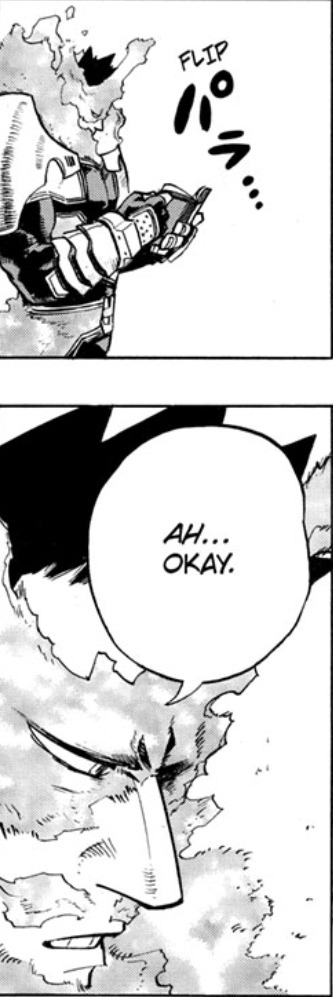
(and he regards it so awkwardly after hawks leaves. "okay" what, my guy?)

yeah, he suspects something's off right away, but he only starts wondering if hawks couldn't communicate freely with him once he's already chillin in his office (there are doylist drawing/paneling-related explanations behind this, but the watsonian result is just so funny and good!). so, what, he hadn't even thought "this must be very urgent" or "hawks needs my help" when he beelined to his office, without explaining anything to anyone, and left his interns (and Very Important son) waiting for him? a guy he knew for maybe a cumulative day and fought beside once reappears acting weirder than before (but he's always weird, right?) and enji tunnel-visions on his book recommendation?
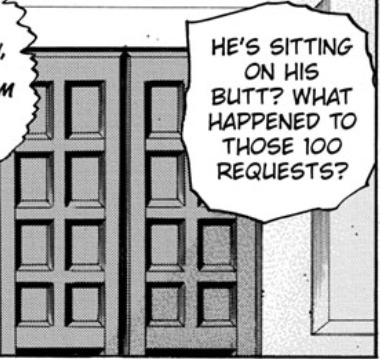
it's emphasized that he literally has more pressing things he has to do, but nope, hawks was out-of-sorts so now we have to be on the case for what, among the bajillion explanations, could possibly have been the cause. (since the last time they spoke, endeavor expressed his concern about hawks investigating the nomu, so he is primed to be a little extra worried. but that fact, believe it or not, still does not help beat the allegations.)
a shapeshifting villain attempting to impersonate hawks wouldn't have made it 10 seconds in front of this guy, istg. enji really stumbled head-over-ass into his first decent acquaintanceship with someone (who happens to be oppositely but equally as emotionally immature as him) and stumbled out of it lowkey obsessed and with an eternal soul-bond or something, i dunno.
54 notes
·
View notes
Text
day 9 in endhawks hell (actually over a year in endhawks hell but moving on):
not one to spread apocryphal info on the internet but my very unverified source (my friend) told me that losing a right arm in anime/japanese media symbolizes shame, disgrace, some other kinda downfall, or the need to redeem oneself. to be clear i have not found an actual source on this, but it definitely would explain a LOT (tears of the kingdom, aot, fma, hunter x hunter, so many more)
and big surprise, that all 100% tracks with endeavor's loss of his arm. if we were to assume all the symbolism is true and accurately described by me (which i encourage not to assume outside of this post), it's very interesting that endeavor loses it in the afo fight protecting hawks rather than in his fight with touya.

it should be noted that him losing his temper is what indirectly places hawks (and tokoyami and jiro) in danger, bc his rage at afo opened him up to injury and being absent from part of the fight in the first place. i also appreciate that, when hawks shouts at endeavor to "keep a cool head" in the face of afo's psychological warfare and endeavor fails to do so, hawks very clearly doesn't view this as weakness, but as a natural human reaction and is mainly worried about him--whereas endeavor is furious with himself right after the fact.


he says it outright in the text--that from the beginning, the whole tragedy, even his rage at afo leading to his current injury, is all only made possible because of the wounds he inflicted on his family in the first place. it's also notable that endeavor's inability to manage his anger, rather than having anger at all, was a core aspect of his abusive outbursts in the past, and his initial fall to afo in this fight. his temper continues to be a source of problems for himself and those around him.
and while endeavor made an overt mistake, hawks made a covert one: it is confronting his own emotions, rather than shutting them away (making a "clean break", as it were), that allows endeavor to re-enter the fight in full.

in result, endeavor's struggles with his own shame create an opportunity for hawks to be killed, but in accepting his shame, he saves him. (aside: the playful echo of "keep a cool head" in the above panel is so ridiculous. non-judgmental, trusting, teasing--knowing, yet forgiving/appreciative--like hawks and his intern hadn't just nearly died, lmao. arms were lost but there's always time to squeeze in a wisecrack)
this also fits well with hawks initially thinking that it's because endeavor is in an emotionally vulnerable place that he couldn't fight touya without losing (read: dying).

hawks initially felt certain that endeavor needed his support and protection because the man wasn't shutting his emotions away--but it's after endeavor is able to resurge back with his emotionality intact that hawks reverses his decision and is the one encouraging him to be the one to confront touya. and with full confidence! (the, uh, touya fight was a hair's breadth from ~not going well~, but let's not tell hawks that right now lol)


to slightly shift back to this "clean break" moment: by contrasting himself against endeavor, who is trying to do better = still vulnerable to the past = has emotions that the enemy can exploit, hawks implies that he doesn't see himself as being the same on *any* of those counts, which is a sad thing to realize. shutting off his heart? not being a better person than he was before? this implication would have benefitted from more intentional and clear closure in the manga (i think the single tiny frame of hawks talking with tokoyami in 430 is just *fine*, ish), but at any rate, endeavor certainly sets a solid example of a person learning to open themself up to these sorts of things, and those lessons are ones hawks could very much use.
anyway, in short, thematically/symbolically/what-have-you, endeavor's work towards atoning for his family, taking more emotional accountability, and accepting emotions rather than rejecting them is connected to inspiring hawks, doing right by him, and even saving him a second time.
23 notes
·
View notes
Text
day 8 of me ignoring how long a week is so i can keep talking about endhawks:
i find it hilarious how, once i'd put the shipping goggles on and strapped in for the ride, the endhawks rabbithole just got ever-so-gayer by increasing increments. the promotional materials, the official art--
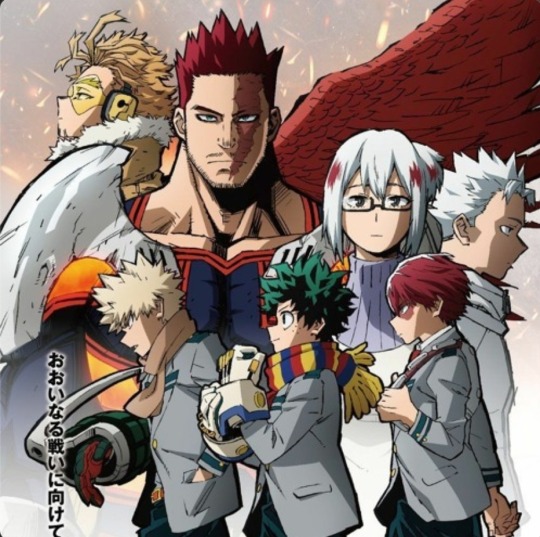
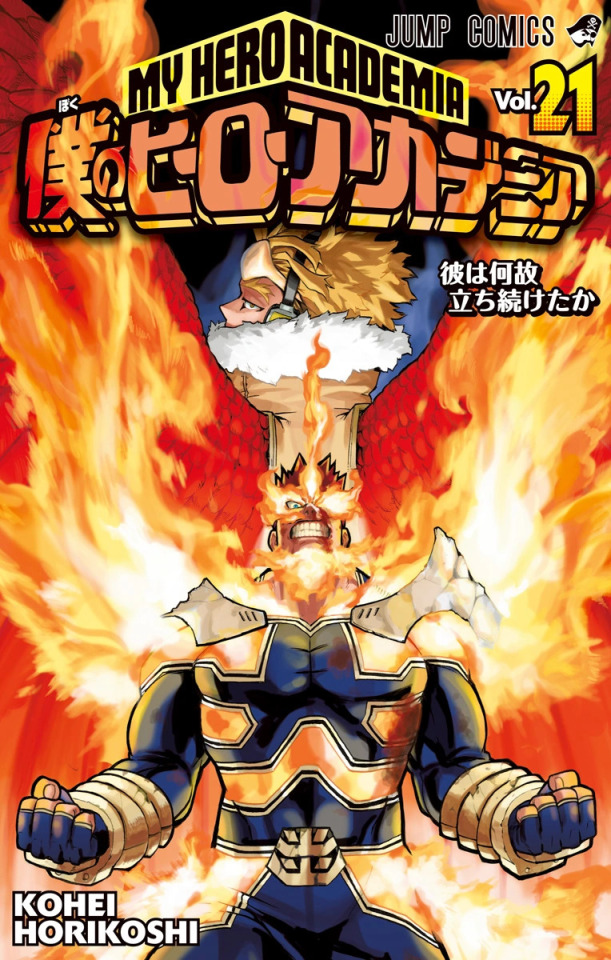
like, sure, i know hawks facing the same way as the interns in image 1 is supposed to give "looking towards the light of the future" and that the over-the-shoulder in image 2 is supposed to give "ambiguous feelings, double-agent-ness, and being cool alongside teamwork/rebirth", but...why is it also giving wistful-soul-bond in the first and femme fatale in the second. who is responsible for this
"oh biiiig deaaaal two 2D characters exist in 2D space relative to each other congratu-fuckin-lations" and honestly,,,,, yeah!!! so true! lmao
i'm also including the image below bc i only stumbled upon it the other day and it's pretty darn cute. (this kinda makes hawks appear more essential to the interns/that particular arc than he actually is...? he and endeavor really are a set)
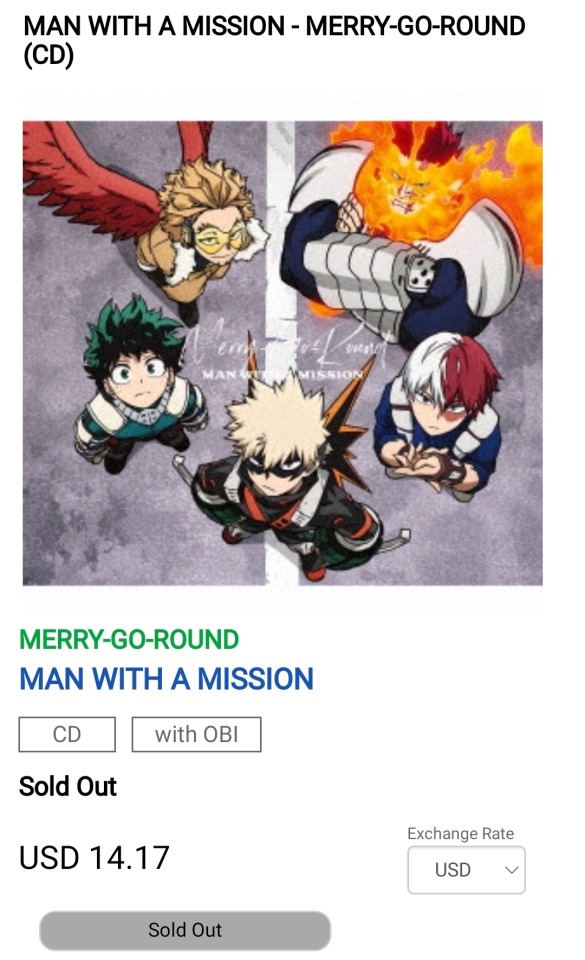
and these are just the tip of the iceberg--it really does just keep going. "oh they have merch? 😊 --oh there's a LOT of merch--whattaya mean there's a RING???"
also tumblr didn't let me post multiple vids yesterday and is weird about audio so here's a tacked-on spotlight of another voice acting moment i liked from the anime. i just really got a sense of the devastation hawks feels for endeavor's sake in the AFO fight:
the whole onlooker-who-cares-for-person-now-upset-over-said-person-receiving-horrible-knowledge is such a very specific trope (it's giving riza hawkeye grimacing right before roy mustang goes ballistic and roasts envy in fma) and i love it, even when it necessarily gets less time to breathe in the middle of a shonen fight.
#endhawks#i had saved the high end audio from the day 7 post as “high end more like high GAY”#and the audio for today was “fighting AFO---more like fighting the ALLEGATIONS”#anyway i've got 1-2 more days' worth of posts in me#also y'all have been very nice regarding my ramblings so ty!#mha s7 spoilers#fr the endhawks promotions get so specific and for what#mainly it all makes me very happy but ig capitalism is the biggest winner in a ship war
25 notes
·
View notes
Text
day 7 of shidding n farding about endhawks:
i mainly wanna shine a spotlight on the voice acting in mha. people extract romantic significance and ship things based on very different factors---eye contact, hand-holding, friendship, emotional intensity whether positive or negative, blushing, shared themes and how the narrative frames the characters--and the list goes on--and personally, i gotta say that voice acting definitely is one of those factors for me!
needless to say, the voice acting is part of what initially put endhawks on my radar at all. hawks's introduction very efficiently establishes him as collected and unflappable, but in the high-end fight that mask crumbles. (also pardon the void--crunchyroll blocked my screen recorder, so the media is purely in asmr-podcast-form ig) ((in both english and japanese!))
i mean, the raw dialogue was already doing a lot, but the voice acting enhanced it even further. in these couple of lines i had to reckon with the earnestness, the familiarity, the affection, the desperation to help, and wonder where all of that was coming from. from a doylist pov, obviously, none of that was supposed to sound romantic, but from a watsonian pov the possibilities were endless! funnily enough (and there are for sure plenty of folks who validly disagree), the tone of voice to me did not sound remotely filial--like idk i love members of my family but i don't sound like that when i talk about them, and it'd feel a lil weird if i did--but that judgment of mine is personal to me and based on a lot of vocal subtleties that can easily be read as platonic by someone else. i recognize that subjectivity applies extra hard to things like tone of voice and facial expressions (i've absolutely been on either side of seeing the shipping vibes or not seeing them at all), but i think that subjectivity is more of a feature than a bug! it's part of what makes things interesting!
so anyway, when hawks was introduced to endeavor at first i was like "haha what an odd couple, ig the flaming garbage man is bumping up against a colleague for a second so he'll get humbled and then that'll be it"--then hawks started really sayin and doin shit that had me like "oh. so it's like that then. sorry my mistake" lol.
10 notes
·
View notes
Text
day 6 of being unhinged about fictional 2d men:
i definitely wouldn't call hawks's phone usage symbolic, but i would call it *organic* in how it reflects or emphasizes each section of his character arc!
when he's being used as a tool while acting as double-agent, the phone is one of the vehicles through which he wears his masks, receives orders from either side, and honestly i'd imagine it's a source of stress considering the situation he's in. his fans assume he'd use a phone for what most average people would--for actual relationships and genuine communication, obviously--and ask if he's talking to a girlfriend or something while he's talking to dabi. and needless to say, honest relationships and communication are very much not the name of the game at this time for him, lol. at the end of the day, it's about allowing himself to be used in the ways he deems necessary for achieving the best outcome. his character is nothing but performance after performance from his very introduction, a double-agent from the start, constantly scrutinized, and his phone usage reflects that.


(tangent: appropriately, as a constant peformer, all of his core relationships with other characters initially hinge on some tension surrounding belief---tokoyami believes in him but is also frustrated to know he's being used/that there's some disingenuousness to their relationship at first; twice believes in hawks wholeheartedly, and ultimately too much; dabi never believed in hawks at all; and endeavor is frequently left to question hawks's performance, but ultimately believes in him with a great deal of faith.)
the toxicity bubbling underneath hero society is represented in a multifaceted way through endeavor's, the commission's, and hawks's own wrongdoings, which all intersect and come to a head with dabi burning him. in the aftermath, hawks carries the consequences of herodom directly on his body, and his phone emphasizes the severe state he's in, filling in for his voice at a time when his voice has been literally taken away. this is a low point where a lot of characters grapple with betrayal, guilt, and judgment--and it's also a time of resilience.

his phone is a practical thing after the raid, strictly business for the most part--typical of a side-character in a shonen conveying information to the audience--while he is also working hard to pick up some of the pieces of what's been broken.

he avoids using his phone to reciprocate when tokoyami keeps trying to reach him. a relationship with tokoyami that isn't at arms-length is a commitment to being more open and vulnerable to someone who looks up to hawks rather than the other way around, and based on thought patterns and dialogue during the final war, it seems hawks seriously struggles with the idea that he's someone worth looking up to.


at midoriya's retrieval, there's a bit of standing to the side and remarking "wow look at what those crazy kids are doing", again á la shonen side character, but also a moment that has hawks distantly interacting with a model of what emotional vulnerability and intimacy looks like. him bearing witness to 1-a getting midoriya back ends up being critical to his understanding of one for all after uraraka's speech, and the whole ofa-connecting-peoples'-hearts-thing is a pretty transparent vehicle for one of mha's main ideas: that reaching out to others, even when hard, is what saves them and makes the world a better place. suddenly, hawks's original goals of saving people and creating a peaceful world become intertwined with being emotionally open to others (while his work as a hero up until this point, alongside his trauma, has had him doing the very opposite).



and *finally* as of 430 he's using the phone more like how a person normally would--for personal communication and relationships (and some job stuff still, but even so). with endeavor's retirement, there is no more pretense/obligation to the betterment of society to fall back on as to why he reaches out. enji is no longer the number 1 whom so many rely on, and when hawks offers him his support, it can serve no other purpose than simply being something for their personal gratification. hawks isn't propping enji up as a powerful public figure who needs to succeed, but talks to him because that's what hawks genuinely wants to do. and considering that enji has had no insight into hawks's lil thought bubbles prior, this is the first real moment that he can have direct confirmation of that fact. and with that, hawks did it! he talked to a friend! it's a start ☺️👏👏👏👏👏

i see all this is more serendipitous than super 100% deliberate, but when one writes a character arc that actually ends up going somewhere, then that character's interactions with even everyday objects will naturally come to parallel wherever they're at in their arc.
17 notes
·
View notes
Text
day 5 of meandering about endeavor (and briefly hawks)--(taking a more meta-look at the fandom with this one):
i find it fascinating and honestly sorta cool that the fandom is so divided on endeavor in a way that lines up well with how people are divided on his character within the text itself.
the responses are certainly not black-and-white or binary, but it's easiest for me to give the examples of hawks and natsuo as sorta opposite ends of the spectrum. many endeavor fans are similar to hawks--enjoying his cooler moments while also greatly appreciating how much he puts himself through in his efforts to change for the better (as an aside, i do find it hilarious how many endeavor fans enjoy seeing that man beat the shit out of and actively suffering. kinky lol). endeavor haters, on the other hand, generally want nothing to do with his character (while some even say that they want him to die, when it comes to fictional people in a story, that's basically the equivalent of "keep this guy far away from me"). the need for unequivocal and complete separation from his character is similar to what natsuo wants and sticks with in the story (although he does have his moments of sensitivity regarding his father, in spite of this).
i think that the reasoning behind irl fans and the characters also often align. for hawks, it's incredibly inspiring and gratifying to see that someone is willing to put in the work to change, even if doing so will be difficult and often unrewarding. the worse the actions are, the more painful the upward climb becomes, but also the more crazy it is that the person in question is willing to make that climb in the first place. i've noticed a lot of endhawks fans in particular really finding a lot of personal healing through exploring these ideas, whether they want to change for the better themselves, or they wish those in their life who'd hurt them would be willing to grow as people the way endeavor's character does. sure, there are some people who gloss over the terrible things that he's done, but many seem to enjoy actively engaging with what he's done and working through what it means for them.
for natsuo, it's not just about it being "too little, too late", though that's definitely a big part--but also that he as a person cannot have a relationship with his father while keeping himself safe and healthy. a lot of real-life relationships end up this way, especially between parent and child once the child reaches adulthood, and it's a very healthy boundary to set. for irl people engaging with fiction that triggers similar emotions, this looks more like ignoring, not engaging with, or wishing for the removal of the character activating them---and if that "boundary"-esque wall can't be drawn, if they repeatedly are unable to avoid the character's presence, this often wells up as anger and turns into venting, which is only natural if you're being bombarded with a stimulus that you feel unable to control. (sure, blocking and filtering tags is available, but algorithms can be incredibly confounding/unavoidable, not everyone remembers to tag their stuff perfectly every time, and in this case, the maligned character plays an incredibly crucial and central role in the canon material itself--so if you want to consume, y'know, mha, you have to grapple with a text that at best isn't always for you, or at worst occasionally betrays you.)
i don't mean to overstate my case--a lotta ppl like stuff or hate stuff without questioning it--but i think in the case of this one particular character, a lot of nuance tends to emerge, and there's a lot of potential there for analysis/learning. I also think that some conflict and friction becomes inevitable between disagreeing fans regarding endeavor's character. naturally, your average person getting crushed in the gears of day-to-day life is going to feel hurt when they're accused of not engaging with the thing that brings them much-needed comfort in the "correct" way, especially if they have indeed been putting a lot of work into thoughtfully engaging with it behind-the-scenes. it's also difficult to give people you disagree with the benefit of the doubt, bc honestly there are plenty of wild takes or arguments made in bad faith out there--and very few ppl want to wade through a bunch of cortisol-spiking statements just to find one that is reasonable enough but that still might be disagreeable to them.
it's likewise interesting to see the reactions of people either calling hawks a murderer and hating on his character, or claiming he did nothing wrong and that twice shouldn't have fought/deserved to die (and while i can understand wanting to defend silly bbygirl birdman, man oh man would hawks not be happy with the latter take if he were a Real Boy). i don't believe either group comprises the majority of mha fans by a longshot, but there's still enough that i've noticed these little trends in one pocket of the internet or amother. i got nothin prescriptive here, i just find it all interesting to talk about.
lastly, i wanna say that, while telling stories from the POV of an abuser and trying to give them sympathy at the same time is so often a gross and very Bad Move, crazily enough i think mha is one of the best executions of this that i've seen. aside from the nuanced way endeavor gets treated by other characters (some supportive, some rightfully angry, some rightfully hateful), what stands out to me is that, by having us see through his pov, the story actually shows what anyone could realistically expect as a best-case-scenario of an abuser starting to atone. we don't have to question if he's sorry, don't have to question if he understands what he did as wrong, don't have to question that he's doing actionable things to make progress, etc., because we spend so much time with his thoughts. and it's not perfectly linear and it does come way too late, but it is kind of wild to see this kind of best-case evolution unfold bit by bit. of course, the flipside to this is that real life doesn't work this way and you can never have absolute certainty that an abuser genuinely understands/won't go on to abuse again. still, being able to see a direct model for what accountability and working towards atonement looks like is refreshing, when by comparison so many other character arcs in other stories 1) end in redemption through death, 2) have the character barely do any internal work/stay an absolute asshole, or 3) resolve a past "sin" that actually wasn't that bad to begin with. when all three tropes are avoided, when someone did something unforgivable but is veritably changing for the better but is still alive, what the heck happens next? what the hell do you do? what does anyone do? some options are explored in mha in a pretty neat way--natsuo never wants to see enji, and enji agrees. touya wants to see enji every day (at least implicitly so) and enji makes that his vow. so many flawed parents irl are unable to respect their childrens' wishes when it comes to letting them completely go so they can live their lives, or when it comes to staying ever-present and showing them genuine care, and yet enji becomes a parent capable of doing both opposite-seeming things at once, finally willing to do and become what his children ask of him. the todoroki saga is certainly not perfect---i for one have *thoughts* about how the very end of rei's arc has been handled---but i think it's unique for how it benefits from providing so much of endeavor's pov, whereas other stories from an abuser's pov might have slapped on shitty apologia or only provided an "explanation" for why that character is so nasty without going too much further than that. while this choice may force some fans to have a level of closeness with a character whose presence begets feelings of hurt and hopelessness, it also makes sense why this choice has captivated other fans and provided, oddly enough, a sense of inspiration and hope.
#mha manga spoilers#tw abuse#endeavor#whenever i think of mha fans fighting i just see traumatized-neurodivergent-gay on traumatized-neurodivergent-gay violence#again not prescriptive i just like crackin jokes#i mean sure good internet etiquette should be encouraged and flame wars should be discouraged but idk im not your mom go have fun#flame wars! see what i did there#endhawks#at least mentioned once anyway
26 notes
·
View notes
Text
day 4 of being incredibly normal about hawks and endeavor (but mostly talking about manga spoilers in general):
mha is a story incredibly interested in exploring generational support, generational abuse, and what people pass on to each other (alongside hand motifs and showing the childhoods of different characters). you pretty much can't get through any arc without running facefirst into a plethora of examples, but ofa and afo are fun (and perhaps appropriate) places to start!
horikoshi features doomed siblings almost as much as he features terrible fathers, and these two are no exceptions. alongside those versatile hand motifs, afo literally uses his hands to take from others, while anything he has to "give" goes to those younger than him, and it's pretty much always a direct vehicle for trauma. it works well that he's lived for such a long time, literally sustaining his own life thanks to hoarding more and more power and resources for himself, while also giving him that age hegemony over all other characters we meet. he thusly kinda becomes the mustache-twirly Evil Dad² in a metaphorical sense, ruining the futures of others as he attempts to write his own narrative exactly how he wants it (storytelling is also a big theme in mha, go figure. when i consider that one definition of trauma--as something that disrupts the narrative one has of themself--and how AFO hands out trauma also as a way of commanding power and controlling the narrative, it really all comes together).

Yoichi is, of course, opposite in so many ways, centered around giving instead of taking. the inception of ofa began as a (very, uh, heterosexual i'm sure) act of granting freedom and sacrifice.

the ofa wielders don't just give their powers to the stockpiling quirk; they also give their lives, through combat or through cutting their lifespans or both. opposite to afo's Big Mean Father² lifespan, the lifespans of the ofa wielders are very short. they sacrifice their own futures to make the futures of others brighter. and of course, through the act of passing on the quirk, ofa necessitates an act of giving from one user to the next. it's a hand-off of counsel, support, and duty that helps shape each receiver into the best kind of hero they can be. afo passes down trauma, and ofa passes down tools for one's betterment. pretty standard parallels to how a bad caretaker/good caretaker can, even through a single act, shape an entire existence younger than them. relatable! trauma nation rise up!! 💪💪💪
with these themes in mind, then, it's a no-brainer as to why mha features so many godawful fathers (also i'd bet a hundred bucks horikoshi has daddy issues. a thousand. a trillion, honestly. gimme money). though relationships that fall outside the clear-cut power-dynamic of a parent to their child still carry these themes well. peer-to-peer,


sibling-to-sibling, etc., the list of other examples goes on and on!
endeavor's character certainly straddles a lot of these ideas, perpetuating a lot of column A (bad) and a bit of column B (good). he receives trauma from his father in the form of spiraling thoughts about failure and mortality (and maybe those two things are totally equivalent, right?) ((they're not)). his response to that trauma then goes far in the other direction, an obsession with herodom and invulnerability (especially avoiding or punishing emotional vulnerability) that passes the trauma right down to his family. in all his desperation to avoid the tragedy of his father's death, he ends up causing the tragedy to repeat itself, this time with touya's (apparent) death. it's even a direct result of the quirk he gave to touya. every intangible and tangible thing touya inherited from his father would only go on to hurt him, and the worst thing that could possibly have happened does indeed happen. instead of coming to terms with the fact that he gave touya the wrong things---trauma and a fire to burn himself with---he gives more of the same to shoto. surely the same tragedy won't repeat a third time. surely what he passes down to his youngest will make him come out of everything gloriously successful and *alive* (and those two things are totally, definitely equivalent) ((and again, they're not)).
what blows my mind is just how close the todoroki family was to witnessing yet another repeat of the tragedy--that they might have watched endeavor die while failing to save someone, just as endeavor had watched his own father do the same---and that they nearly had to bury touya a second time.
similarly, when it comes to the past transferring to the future, childhoods are the foundations upon which peoples's futures are built. characters are not only shown in a state of emotional vulnerability when in Baby Form, but are also responding to and trying to find answers to each others's traumas and core drives.


in a sense, they don't just inherit their worldviews from the prior generations, but from themselves. when we see endeavor confront his younger self, he isn't only killing off who he used to be, but also all the conclusions he had drawn from his own childhood--a rejection of what his trauma response got wrong. most people have to learn to stop being cruel to their inner child, whereas his inner child is the cruelest voice within.

anyway, for all the Bad Shit endeavor has passed on to the next generation, the future and hope he provides for hawks is something else. despite all white-knuckled efforts, he doesn't end up saving his family, nor himself, and certainly not touya, but he saves hawks, and that one instance contributes to the entire idea of ofa and the question of what different people can give to each other.

as invested as hawks is in the future, he initially keeps himself pretty distant when it comes to those younger than him. there isn't much explicitly given as to why, but it's pretty natural to assume that he really doesn't have the tools to pass on anything healthy--not after what he's been given by others. the one good thing he knows how to give is the one good thing he's received, which is the act of saving itself. being a pro is the only language he has for the longest time, and once his back's to the wall and he has to give tokoyami whatever he can, we see how readily he assumes that what he has to offer just isn't good enough.


(not only did his parents pass trauma onto him, but in valuing or devaluing his wings and thereby making his worth always conditional, they also affected what he could then pass on to others ((or at least, how he conceived of what he could give)).)
in my view, hawks gives tokoyami flight and endeavor support, and from tokoyami he receives the idea that he's someone worth looking up to and fighting beside despite his shortcomings, while from endeavor he not only got saved as a child but also receives a proof-of-concept of the ability to radically change, to wind up in a morally/emotionally better place than where one started. (he not only contrasts himself against shoto for the kid's ability to forgive/work with his parents, but notably contrasts himself against endeavor due to the latter's willingness to engage with his past, which he views as a vulnerability but also as something admirable.)
given keigo's middling age in the main cast of characters and the interesting space he occupies, it's fitting that he would ultimately act as a sort of channel between the generations of heroes as of the finale, retaining some of the value from what came previously while also helping guide what comes in the future.
#oh god these just keep getting longer and longer#mha manga spoilers#also shout-out to tenko for being the prime example of the hands and passing-down motif#like my guy inherited so much trauma and literal destructive ability that he is the ultimate Hand-Imagery Man of anime#which is seriously saying something#*slaps roof of tenko* this anime lad can fit so many fucking f̷̼͎̄̍i̵̦̓n̶̡̫͍̦̱̎̑̍g̸̣̰̳̪̯̑̐͠e̶̡̢͎̬͂͝r̴̔͑̊̽͜s̸̞̳͉͓̅́̏͘͝ in him#take that as you will ig idk#endhawks#if you squint#honestly if someone responded with just “not reading that essay” they'd be so right and i'd have nothing but respect
36 notes
·
View notes
Text
day 3 of going off on an (only sorta) endhawks tangent: the "just watch me"/"look at me"/"watching" theme in mha gets a ton of mileage, not just with the todofam, but also with hawks (and every other character in the story). this is pretty apparent and many have analyzed this point before, but i'm also interested in how definitionally "watching" ends up taking on a variety of meanings depending on how it's used in the story. (might be a good place to acknowledge that phrases and actions involving eyesight are super commonplace already, but i don't personally tend to exclude more serendipitous/vibey examples!) at times, "watching" or "seeing" can be taken to mean being inspired by, being critical of, holding accountable,


acknowledging/honoring a relationship (aka truly "seeing" a person for who they are), and even caring for another. to "see" someone becomes an opportunity to know them, and to not "see" someone is a tragedy.


it ends up echoing a lot of how heroes are treated as individuals by society--from being watched and judged,


to being "looked at" and communally taken care of.

by extension, the story of mha greatly encourages each and every member of society to not only inspire each other to goodness, but to also foster honest and insightful emotional intimacy. to "see" is to know, and to know someone else's suffering is essential to helping and ultimately loving them.


the meaning behind hawks watching endeavor also follows a somewhat similar trajectory to how society "watches" heroes--being inspired by him, forming a relationship with him, a brief but nuanced moment of judgment and accountability, and finally watching as an extension of care.

17 notes
·
View notes